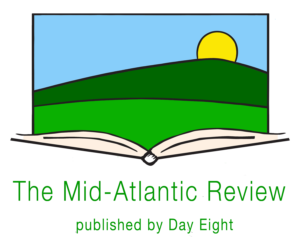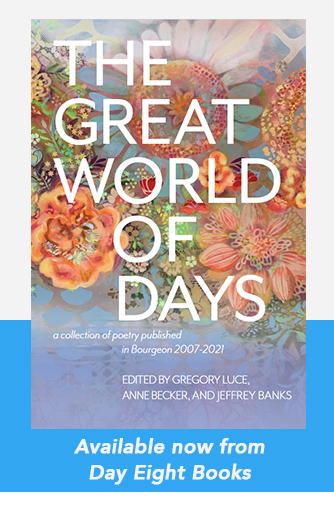The Descent of Discourse
Such conspicuous consumers, utilizing
calls and patterns, colors and scents,
faces and stances and gaits, sensitive to
the foggiest gesticulations, the slightest
seismic vibrations, we are always in
danger in dialogue. There’s mischief
and worse. So we learn whole lexicons
for alarms and threats, edibles and sex
and intoxicants, boasts and laments,
absorbing the slang of pain and play,
the vernaculars for pleasure, hunger,
shame, elaborate analogies for intimacy
and tedium and awe. Still, for most
of the conversation, we are completely
lost. And we look ridiculous, twisting
and sidestepping, caught in a constant
state of doublespeak, but we can’t stop
once we start, and we can’t say who
or what put this absurd dance on us,
what’s creature and what’s culture.
We have so many expressions—such
specificity—but so often we mistake
complexity for chaos, what’s spoken
for what’s heard. Nearly any signal is
costly, honest or not, but we babble
on incessantly, compulsively—giddy,
awkward—until we are exhausted by
the monumental effort it takes to
make any sense at all, until protecting
and pressing against each other in
the darkness and silence is no less
beautiful than a brand new word.
The Descent of Dreaming
We are rife with advantages. Handy,
cerebral, we fool ourselves into thinking
we can see what’s invisible, touch
the intangible. We are nothing if not
resourceful. Unwittingly, we actually eat
with our eyes, feel with our ears, make
believe we can experience a world
anyone else experiences, disposed,
as we are, to dreaming, concocting
meaning from the meaningless. We
learn to notice most what’s useful, and
these mirages, these myths, they are
instructive. They teach us it’s possible
to choose who will be the monster
in the story and who will be the martyr,
what will be the poison and what will
be the cure. They disguise the inescapable:
that we can never go back, and we’ll never
see the end coming, and in the meantime
we can’t avoid feeding the chaos churning
inside us, living these lives of unchecked
perplexity and conjecture. We can’t help
but be untrue. Delicate, transitory, we are
all singular experiments of sensory fidelity,
impossible to duplicate or corroborate,
exceptional jumbles of electrical impulses,
peculiar, wondrous knots of lightning
strikes sparkling through carbon.
The Descent of Dependency
We are made of complicated, bloodshot
rock, freak accidents, and exponentially
accumulating secrets, and we are carved,
in part, by the peculiar ways we learn to
court joy, by the spells we craft to conjure
and keep it, by how easily and gracefully
we can receive it. Mainly, though, we are
cut by pain, bent by the kind and quality
of respite we invent, by how frequently
and brazenly we seek any degree of relief.
We can never cop to all the ways we use
each other, all the ways we’re susceptible
to suggestion, to withdrawal, to abuse, all
the ways we’re wasted. Most losses cannot
be recovered, only reconsidered or reframed,
and we are reckless with everything precious.
Plagued by pyrrhic victories, unmitigated
calamities, by uncanny, madcap conspiracies,
we can’t seem to learn the world well enough
—even with its explicit, moralizing warnings,
despite our flagrantly risky and excessive
testing. We can’t trust ourselves around
the story. Revising unwisely, blacking out
too much too often, we are provoked by
pure dread, by the trouble we have feeling
we have any power whatsoever. We pick up
the saddest habits, entertain the most toxic
propositions, sanctify the scariest spirits,
until we suffer far less from the diseases
we catch than from the ones we create.
Our nature is wayward. Our lives come quick
and intemperate, and we won’t be set straight.

Brandy Whitlock is a librarian and educator living in Baltimore, Maryland. Her poems have appeared in literary magazines like New Orleans Review, Calyx, Salt Hill, The Baltimore Review, The Tusculum Review, and Denver Quarterly.
Image: David S. Soriano, CC BY-SA 4.0 <https://creativecommons.org/licenses/by-sa/4.0>, via Wikimedia Commons



So very proud of my daughter. love, mom